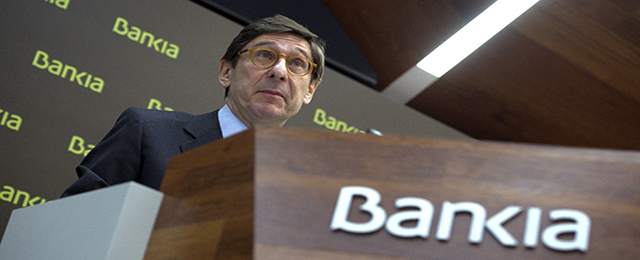With the new bailout funds received, Bankia’s new team assumed a restructuring program the required a balance sheet reduction, selling some assets, reducing implementation and costs, including staff cuts, limiting pay… And they have done almost everything ahead of schedule.
In many respects the new bank begins to be normal lender, a competitor in a market with increasingly fewer actors. In fact there are only a dozen financial institutions left in Spain, five banks and seven savings banks (the so-called cajas) converted into banks, some of them (Bankia and BMN) still waiting to get rid of the FROB’s (the state bank restructuring agency that controls Spain’s nationalized banks) tutelage once they meet their outstanding commitments.
The report that the president of Bankia, José Ignacio Goirigolzarri, presented before the Board insisted on normalization of the entity and its ability to aspire to the best ratios for solvency and profitability. As proof, the proposal is to pay a dividend of 2014 results representing a pay-out of 25%, €200 million, of which 60% will go to the FROB.
Bankia could have allocated all yearly results to reserves, to improve its market capitalization and, predictably, the future price of its shares. To pay dividend before the recovery is completed, before the firm sets all lawsuits with disappointed customers, is somewhat an abrupt move, although the Board has chosen to send messages of solvency to the market.
A non-explicit goal is to accelerate the partial and progressive privatization of Bankia before November general elections in Spain. At least the main part of the company, which means another 10-15% at a not lower price than the 7.5% made public in February of 2014 (1.51%), 30 cents more than the current price (25%). The planned dividend, €0,0175, means a return of 1.43% that can encourage the stock price until a new share selling takes place by the FROB.
With the available data and given the sector and the stock trends it seems reasonable to avoid any rush, to elliminate the electoral situation in Spain from the equation and to bear in mind that it is essential to reduce the State bill. The Spanish Treasury needs to get its money back, even if it takes more time, by Bankia going public. Although it seems obvious that the one managing the calendar is Spanish Minister of economy Luis de Guindos.
*Read more: Bankia issuance challenged.






Be the first to comment on "Bankia’s dividend: Timely or premature?"